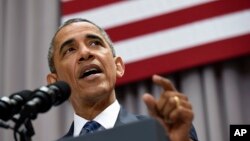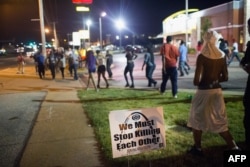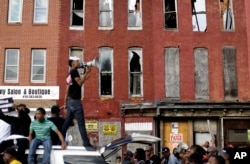U.S. President Barack Obama says in the year since the "tragic death" of Michael Brown in Ferguson, Missouri, the United States has "come to see more clearly than ever, the frustration in many communities of color and the feeling that ... laws can be applied unevenly."
When a white police officer shot unarmed black teenager Brown last summer, the outrage reverberated far beyond Ferguson. The questionable deaths of African Americans in Ferguson, New York, Cleveland, Baltimore and other cities have amplified a movement — begun with the 2012 death of Trayvon Martin in Florida — that "Black Lives Matter."
Nationally, African Americans are arrested at much higher rates than people of other races, the USA Today newspaper found in an analysis of FBI data last year.
Obama said Saturday in his weekly address that in order to face the issues of discrimination "squarely," he convened a task force on community policing — made up of police officers, activists and academics — to find commonsense steps to "build up trust and cooperation between communities and police."
Task force recommendations
The task force made 59 recommendations in May and communities across the country are now working to put those recommendations into action. The president said the suggestions included "everything from how ... [to] ...make better use of data and technology, to how ... [to] ...train police officers, to how law enforcement engages with ... schools."
President Obama said local leaders across the country "are working to implement the task force recommendations in a way that works for their communities." He said the Justice Department will award more than $160 million in grants later this year to support law enforcement and community organizations working to improve policing.
The president said the United States has "made progress. But ... the issues raised over the past year aren't new and they won't be solved by police alone." He added that communites "simply can't ask ... police to contain and control issues that the rest of us aren't willing to address — as a society."
He said America must deal "honestly with issues of race, poverty, and class that leave too many communities feeling isolated and segregated from greater opportunity. It means expanding that opportunity to every American willing to work for it, no matter what zip code they were born into. Because in the end, that's always been the promise of America."







